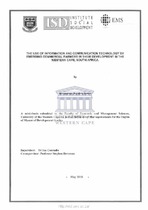The use of information and communication technology by emerging commercial farmers in their development in the Western Cape, South Africa
Abstract
Although many researchers have shown JCT can enable development it remains a great challenge to
understand the link between ICT4D projects and the development of emerging commercial
agriculture. There is a need to realize the potential of information and communication technologies
(JCT) for emerging commercial farmer development in order to achieve agriculture expansion and
transformation in South Africa. This is important in order for them to partake in the knowledge
economy visualized in the 2030 National development plan of South Africa and achieving the
Sustainable Development Goals in 2030. However in South Africa, it is not yet established which
specific JCT are used, how they are used and the extent of deployment if used in the emerging
commercial agricultural sector. Few studies have focused on the factors that influence the use of JCT
in South African emerging agriculture. This study investigates and attempts to understand the usage
of JCT by emerging commercial farmers and the issues that influence ICT use on the West Coast of
the Western Cape Province in South Africa. The study investigates the different forms of JCT used,
how they are being used, what they are used for, how important these technologies are as enablers of
production and the factors that affect their use. The study involved a survey response of 42 emerging
commercial farmers and 46 of their farm employees in the Matzikama and Cederberg municipalities.
A literature review draws from studies globally. regionally and in South Africa on how ICTs have
penetrated and contributed to delivering development in emerging commercial agriculture. Although
most emerging commercial farmers cannot afford to adopt JCT fools that are essential in their
farming activities almost all who were interviewed acknowledged !he importance of JCT to their
businesses. However, among other JCT, mobile phones and television were found to be primarily used
for social and entertainment reasons rather than for agricultural purposes. The general findings
showed that occupation on farm and JCT Literacy influence the use of ICT by farm employees. On the
other hand the gender, capacity of the farmer, off farm income and farm size influences the use of ICT
by emerging commercial farmers. Our literature review established some examples from the studies
of other researchers and the efforts of multi-lateral institutions such as the FAO and ITU to illustrate
how we can improve policy. I recommend that the South African government develop an e-agriculture
strategy to monitor development and validation of good practices on the use of ICTs in
agriculture and rural development. This strategy will examine emerging trends on the role of ICTs
and the challenges faced in reaching scaled, sustainable information service models. This can
increase the sustainability of emerging commercial agriculture to contribute to the improvement of
the lives of the poor in rural areas. Finally I present research questions for future research.

